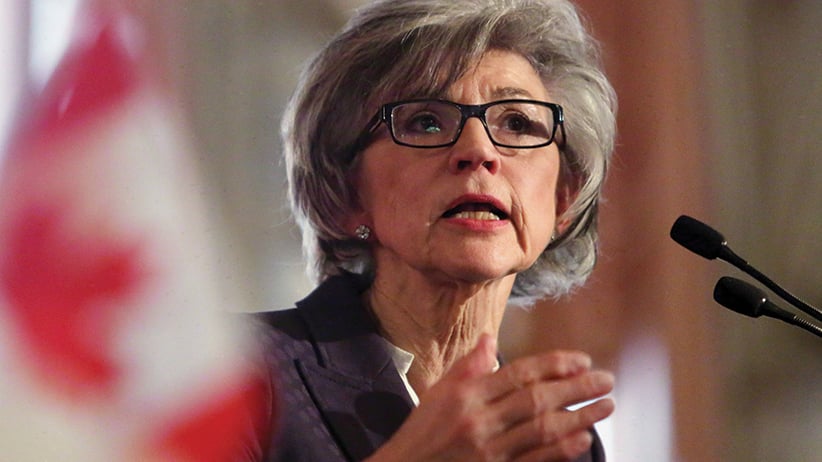Chief Justice McLachlin wanted another woman on the court
‘Gender politics don’t play a role once you get beyond a certain number,’ chief justice says
Supreme Court Judge Beverley McLachlin takes part in the welcoming ceremony for Justice Richard Wagner at the Supreme Court of Canada in Ottawa on Monday, December 3, 2012. THE CANADIAN PRESS/Sean Kilpatrick
Share

Prime Minister Stephen Harper’s announcement this morning naming a woman—Montreal trial lawyer Suzanne Côté—as his choice to fill the latest Quebec vacancy on the Supreme Court of Canada will come as welcome news to the country’s top judge.
Just four days ago, in a rather informal speech to a business audience after a breakfast at Ottawa’s City Hall, Supreme Court Chief Justice Beverley McLachlin spoke candidly about her personal preference for more women on the court, offering a nostalgic anecdote—told with a touch of a passable Scottish brogue—about the late Bertha Wilson, the first woman to sit on Canada’s highest bench.
McLachlin, who is the first woman and longest-serving chief justice in the Supreme Court’s history, was appointed to the court in 1989. At the time, that made her the third woman on the court. Here’s what she had to say on Monday morning about that moment, and more generally about why she likes the idea of more women on the court over which she has presided as chief justice since 2000:
“Of nine justices, presently three are women, and six are men. We haven’t made quite as much progress as I’d hoped. When I was sworn in, I became the third woman on the court, and Bertha Wilson—some of you will remember her, wonderful, feisty lady with a Scottish accent—she leaned over to me at the ceremony, she says, ‘Three down, six to go.’ “
McLachlin got a big laugh by switching to an r-rolling Scottish accent when recounting Wilson’s remark. She went on to explain more seriously how she sees the male-female dynamic on the court actually fading as it gets closer to gender balance:
“That may have scandalized some of the men. But we’re still at three. We got up to four for a while. We’ll have a new appointment coming soon. So, who knows, we may get back up to four, we may not.
“But I, as a woman, find the presence of at least a third of the court being women to be a very good thing. It changes the atmosphere. Gender politics don’t play a role once you get beyond a certain number, and we’re just colleagues deliberating on difficult issues that are brought before us.”
And now we know the roster of women on the court will indeed be, as McLachlin hoped, back to four. Harper’s nominee to replace the retiring Justice Louis LeBel, Suzanne Côté, currently heads of the litigation group in Montreal at the prominent law firm Osler, Hoskin & Harcourt LLP. She will be the first woman from private practice to be directly appointed to the Supreme Court of Canada.